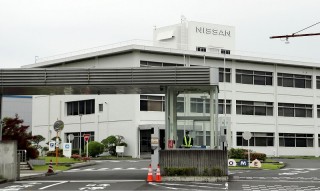Loading
Search
▼ Nissan Plans Large Production Cuts at Key Domestic Plant; Output to be Trimmed to 20% of Capacity in July, August
- Category:Other
Nissan Motor Co. plans to make large-scale production cuts at its key Oppama plant in Yokosuka, Kanagawa Prefecture, in July and August, according to sources.
The move was prompted by sluggish sales of the Nissan Note, a compact car produced at the factory, the sources said. Nissan reportedly plans to reduce production at the plant by nearly 50%, and the production capacity utilization ratio could fall to around 20%.
The Oppama plant is one of seven domestic and overseas factories that Nissan is considering closing. The difficulties facing the plant are becoming pronounced.
During the cutback period, employees at the plant will be engaged in tasks such as maintenance of production lines. Nissan does not plan any layoffs.
The Oppama plant began operations in 1961 as Nissan’s “mother plant” for establishing production technologies. With an annual production capacity of 240,000 units, the plant began producing the Leaf, the world’s first mass-produced electric vehicle, in 2010, and produced five models through 2019.
However, the plant has been downsized partly due to aging facilities. The production of Leaf vehicles was relocated to the Nissan Tochigi plant in Tochigi Prefecture, and only the Note and its derivatives are currently produced at the Oppama plant.
In 2024, the Oppama plant produced approximately 100,000 units and its capacity utilization rate stood at only 40%, far below the break-even point of 70% to 80%.
Sales of the Note were approximately 8,000 units per month from fiscal 2021 to fiscal 2024. Only 4,470 units sold in April 2025, down 25% from the same month last year.
Since there has not been a full model change in the Note since the end of 2020, it has been losing ground to vehicles by other carmakers and stocks of unsold Note cars have accumulated, making it inevitable for the automaker to sharply cut back production.
Nissan reported a consolidated net loss of ¥670.8 billion for the fiscal year ending March 31, 2025. In May, the automaker announced a plan to close seven of its 17 finished-car plants in Japan and overseas by fiscal 2027 in an effort to restructure its business.
In Japan, Nissan is making arrangements to close its Oppama plant and the Shonan plant in Hiratsuka, also in the prefecture, of its subsidiary Nissan Shatai Co. Overseas, the automaker is considering terminating vehicle production in South Africa, India and Argentina and closing two plants in Mexico.
Nissan’s global production capacity stands at 5 million units a year. However, the automaker produced 3.1 million units in fiscal 2024, and the capacity utilization rate has been sluggish at 60%.
Under these circumstances, Nissan plans to consolidate its finished vehicle plants in Japan and overseas by fiscal 2027 to reduce its annual global production capacity, excluding China, to 2.5 million units. It also seeks to increase the capacity utilization rate of the remaining 10 plants to nearly 100%.
The move was prompted by sluggish sales of the Nissan Note, a compact car produced at the factory, the sources said. Nissan reportedly plans to reduce production at the plant by nearly 50%, and the production capacity utilization ratio could fall to around 20%.
The Oppama plant is one of seven domestic and overseas factories that Nissan is considering closing. The difficulties facing the plant are becoming pronounced.
During the cutback period, employees at the plant will be engaged in tasks such as maintenance of production lines. Nissan does not plan any layoffs.
The Oppama plant began operations in 1961 as Nissan’s “mother plant” for establishing production technologies. With an annual production capacity of 240,000 units, the plant began producing the Leaf, the world’s first mass-produced electric vehicle, in 2010, and produced five models through 2019.
However, the plant has been downsized partly due to aging facilities. The production of Leaf vehicles was relocated to the Nissan Tochigi plant in Tochigi Prefecture, and only the Note and its derivatives are currently produced at the Oppama plant.
In 2024, the Oppama plant produced approximately 100,000 units and its capacity utilization rate stood at only 40%, far below the break-even point of 70% to 80%.
Sales of the Note were approximately 8,000 units per month from fiscal 2021 to fiscal 2024. Only 4,470 units sold in April 2025, down 25% from the same month last year.
Since there has not been a full model change in the Note since the end of 2020, it has been losing ground to vehicles by other carmakers and stocks of unsold Note cars have accumulated, making it inevitable for the automaker to sharply cut back production.
Nissan reported a consolidated net loss of ¥670.8 billion for the fiscal year ending March 31, 2025. In May, the automaker announced a plan to close seven of its 17 finished-car plants in Japan and overseas by fiscal 2027 in an effort to restructure its business.
In Japan, Nissan is making arrangements to close its Oppama plant and the Shonan plant in Hiratsuka, also in the prefecture, of its subsidiary Nissan Shatai Co. Overseas, the automaker is considering terminating vehicle production in South Africa, India and Argentina and closing two plants in Mexico.
Nissan’s global production capacity stands at 5 million units a year. However, the automaker produced 3.1 million units in fiscal 2024, and the capacity utilization rate has been sluggish at 60%.
Under these circumstances, Nissan plans to consolidate its finished vehicle plants in Japan and overseas by fiscal 2027 to reduce its annual global production capacity, excluding China, to 2.5 million units. It also seeks to increase the capacity utilization rate of the remaining 10 plants to nearly 100%.
- June 29, 2025
- Comment (1)
- Trackback(0)



rx4o3- July 7, 2025